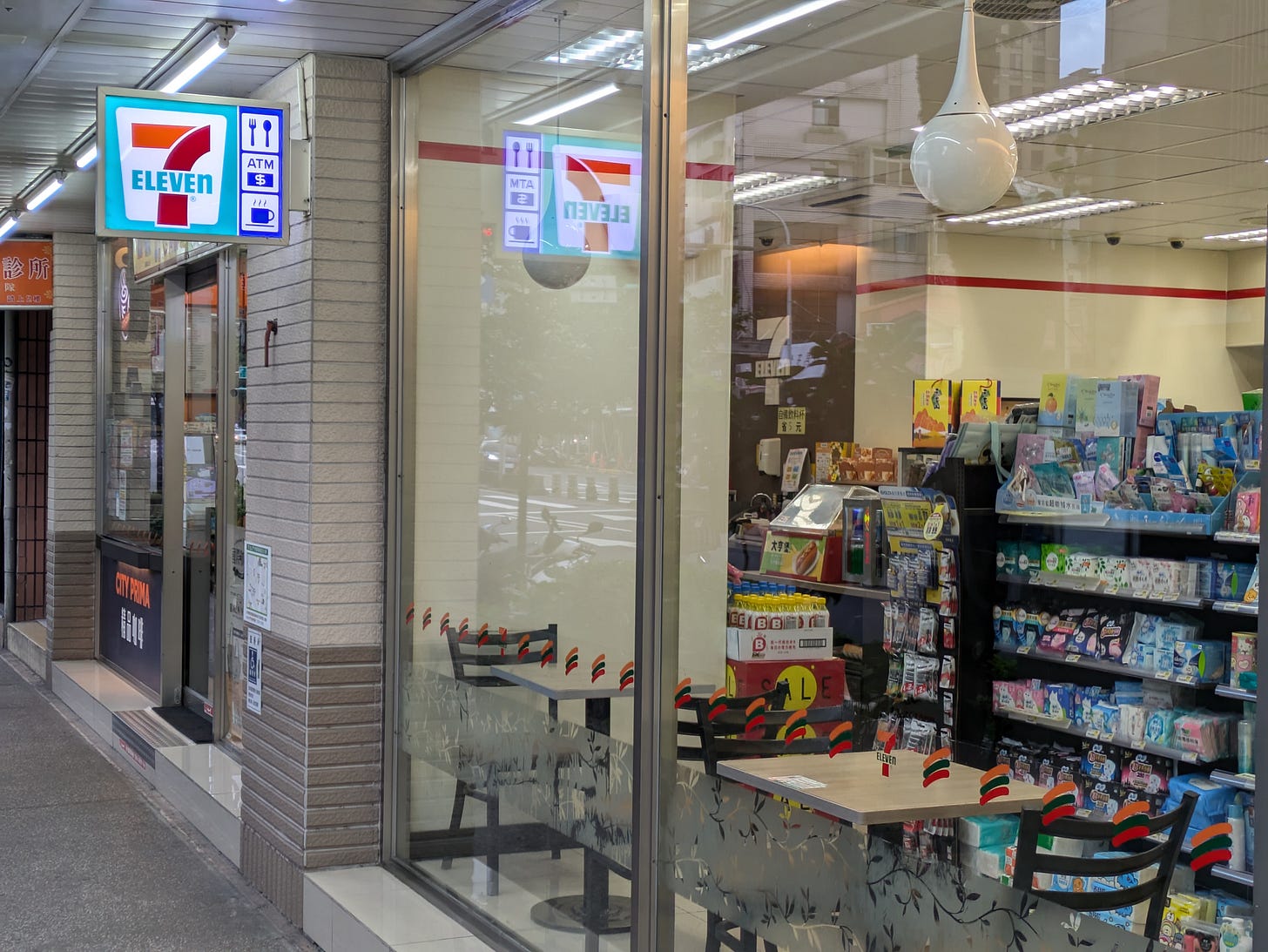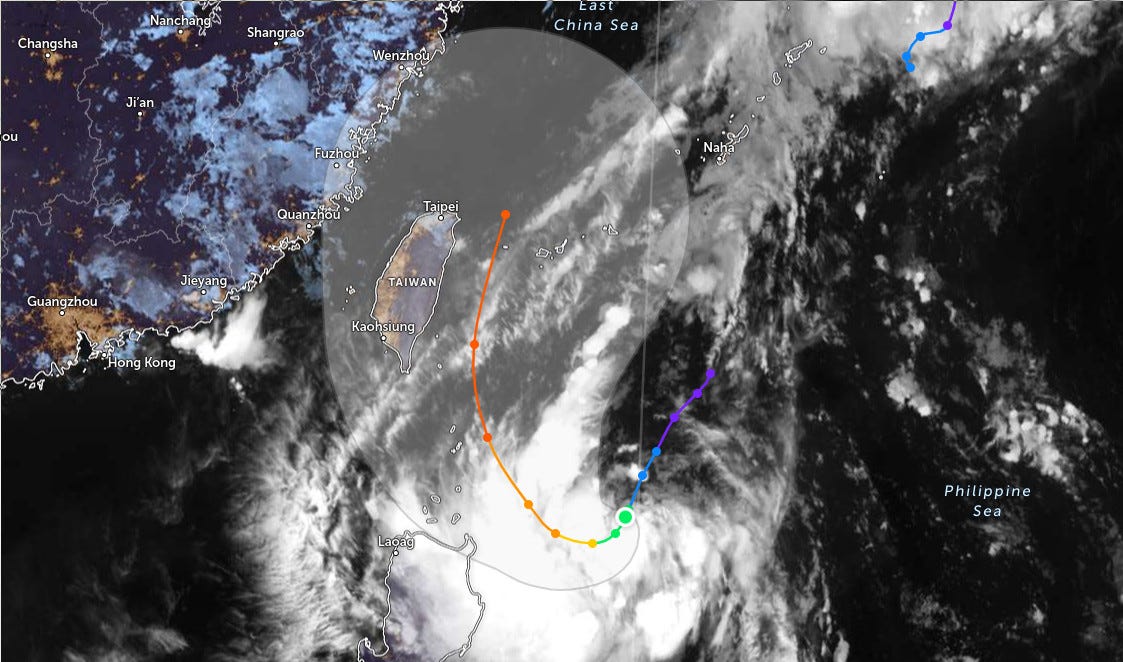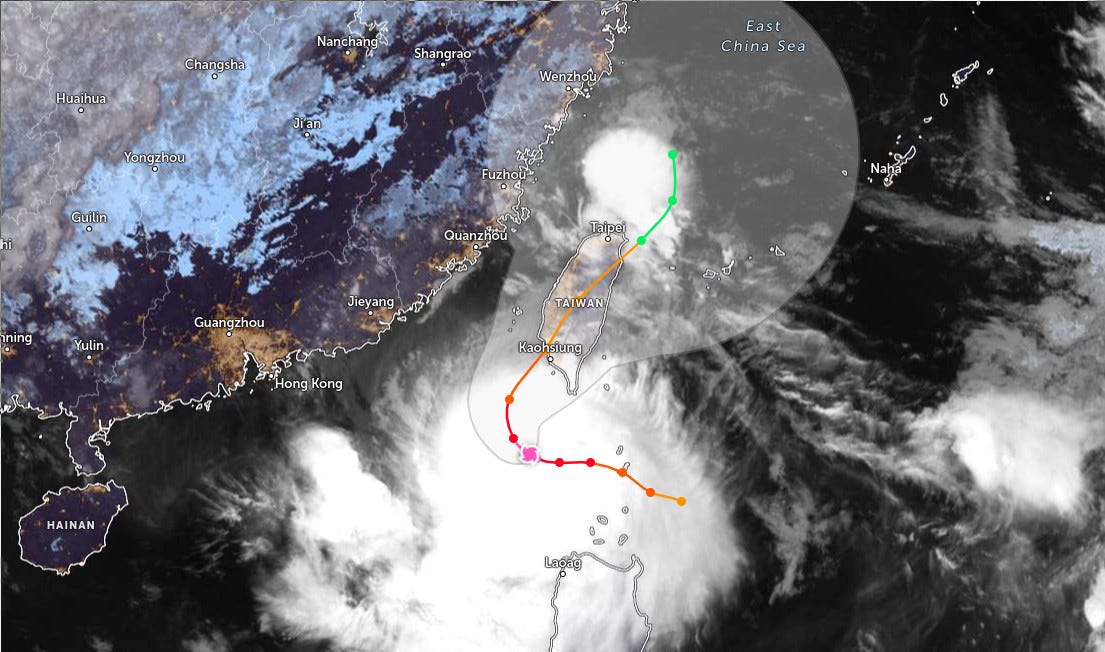Welcome to the October issue of the Peripatetic Historian.
This Month:
Peripatetic Field Report: Man Battles Mandarin, Mandarin Winning
Book News
What’s New in Old News?
Then and Now: Rongjin Gorgeous Time
Let’s get started…
Man Battles Mandarin, Mandarin Winning
Wǒ bù dǒng (我不懂: I don’t understand).
Now there’s a Chinese phrase that has made a home in my mouth.
As mentioned in last month’s edition of the Peripatetic Historian, I have enrolled at the Taipei Language Institute for an intensive course in Mandarin Chinese. I spend three hours each day, five days a week, learning the subtleties of what the US Foreign Services Institute ranks a “Category V” language—the most difficult for native English speakers to acquire. For those of you who are interested, Cantonese, Korean, Japanese, and Arabic are also Category V languages.
Mandarin, notes the FSI, offers the challenges of vocabulary, pronunciation, grammar, and a pictographic writing system. The overlap with English is almost nonexistent—everything is different. One can expect to spend about 2,200 hours of study before attaining an upper-intermediate level of proficiency.
I have logged 75 hours. Still what we would call a “rank beginner,” a chap pulling up buckets from the deep well of incomprehension. If the FSI is correct, and if I could continue at this pace, it would take roughly three years before I reached minimal competency.
These obstacles raise an obvious question: what is the point of devoting time, energy, and tuition fees to a language that I am unlikely to master and may never use once we leave Taiwan? After all, I managed to swan around the middle-eastern world for two years, making my way with a marhaba (hello) and a genial smile. I know how to live in a place where few people speak my native tongue.
My experience in Palestine and Jordan motivated my current language journey. When we first landed in Ramallah, I looked for an Arabic language course. I was unable to find a reasonably priced school, and, rather than searching for a private tutor, I chose to accept my inability to speak Arabic. One year turned to two. By the end of that period I realized the magnitude of my mistake.
Language is a culture’s aria. You miss so much when you’re tone deaf.
So this time I am plunging in and embracing the challenge. From a time management perspective it’s an inefficient use of my day. I’m easily spending 30 hours each week grappling with this thorny tongue. It’s hard, a bit quixotic, but I intend to persist in my struggle to learn a bit of Zhongwen.
Hangin’ at the Seven
When blackened and blued from a day at language school, I can always comfort myself with a retreat to the local 7-11. A mere convenience store in the United States, 7-11s (or “Sevens” as they are called in Taiwan) are a national institution.
Upon entering one of the hundreds (if not thousands; there are three within a five minute walk of my apartment) of branches in Taipei, a uniformed clerk will offer the ritual greeting, Huanying, guanglin (“welcome, you honor us with your presence”).
The stores are smaller than their American counterparts, but they offer so much more. Naturally there is a full range of microwave-ready snacks and meals. Don’t have a microwave at home? One of the helpful clerks will zap it while you wait, and then you can take a seat at a table and join the other Taiwan folk who are dining out.
Need to pay your bills? Put more money on your Metro card? Pick up a package that Amazon has shipped to you? The 7-11 handles it all. It is a one stop shopping center—if you didn’t mind eating out of plastic every day, you might not need to patronize any other store in the city.
The Sevens. They put the capital “C” in Convenience.
Mandarin Mishaps, Volume 1
Our Taipei apartment stands two blocks from the entrance to Dongmen Market, one of the city’s venerable covered shopping areas. Dongmen competes with the Sevens, offering a wide range of (sometimes mysterious and unidentifiable) food and produce. Beneath its tin roofs, the dark alleys and stalls of Dongmen stand as the center of our neighborhood.
I have been trying to take few hops with my fledgling Mandarin, speaking it in my negotiations with the shopkeepers. It doesn’t always go well.
This month I tried to purchase some wax apples at one of the fruit stalls. An ambiguous sign was tacked above the apple bin: 99 NTD (a little over three US dollars). Was that price for each wax apple, a dozen, or some unspecified weight?
Time to dazzle the laoban (owner of the stall) with a little Mandarin. “Zhe ge duoshao qian?” I asked. (These things, how much money?).
The laoban looked confused. I repeated my carefully constructed sentence.
He shook his head mournfully. “Sorry,” he enunciated, slowly. “I don’t speak English.”
Zounds.
Book News
A Quiet Month at the Airfield
I don’t have any fresh news to report about L. A. Birdmen this month. I’ve been a guest on a couple of podcasts that are supposed to be released in November, but until then, I don’t have any updates.
September in What’s New in Old News
I am continuing to publish odd little stories every week over at What’s New in Old News? Last month’s entries include:
A Mayor’s Bold Stand
St. Patrick Shoots at Roosevelt
Sexy Dancer Stirs up Chicago
Please Send me to Prison
If any of these tales sound interesting, click the link for a look: What's New in Old News?
Then and Now: Rongjin Gorgeous Time
Many people don’t realize—and, full disclosure, I was among their number until I arrived here—that Japan colonized Taiwan in 1895 and remained in control of the island until the end of the Second World War. Attempts to reshape Taiwan as a Japanese province didn’t go well. The Japanese expended considerable effort to break the Taiwanese resistance, a job that remained unfinished when the colonialists withdrew as part of the surrender agreement at the end of World War II.
Colonies require prisons to secure their dissidents. Taiwan was no exception. In 1902, the Japanese built a large prison in Taipei—the Taihoku Penalty Institute. Initially, the facility housed those who opposed the occupation; later it secured prisoners captured during World War II.
After the war, the Taiwanese government moved the inmates to a new prison and decommissioned the aging penitentiary. Workers tore down the walls, removing most of the original buildings. One of the original walls and some outbuildings that housed prison officials survived the demolition. Over the past decade, these remnants have been redeveloped as a Japan-themed cultural center.
The official English translation of the name assigned to this new tourist attraction is decidedly odd: “Rongjin Gorgeous Time.” As someone bearing fresh weals from my recent language blunders, I struggle to avoid a small smirk at that mangled phrase. Dropping the Chinese characters into Google Translate brings us a little closer to a useful translation: “Rongjin Time Life Park.”
Despite my best efforts, “Rongjin” resisted translation. Google claimed that it is a Spanish word that means (wait for it) “Rongjin.” I am assuming that it is a Japanese name, transliterated into Chinese characters. “Time Life” suggests past cultures.
Should a representative of Taiwan’s government seek my opinion, I will recommend “Rongjin Heritage Park” as a suitable English title.
In any event, the remaining building houses small businesses dedicated to Japanese culture—tea shops, restaurants, and trinket stores. Reliable sources tell me that the Taiwanese are mad about all things Japanese. The two countries are great friends, at a governmental as well as a personal level. The cultural cross-pollination that failed to materialize during the occupation has now been achieved through Hello Kitty bags and sushi.
Heaven smiles when old adversaries sip from the same tea pot.
Late-Breaking News: Typhoon Julian
Just when I thought that this month’s episode of the Peripatetic Historian was ready for the press, I saw on my weather feed that we are in the potential path of a typhoon. Julian, a tropical depression north of the Philippines, is expected to strengthen, fly a fish hook course, and either strike or brush past Taiwan on Oct. 1-2. The wind speed, at its closest approach, could reach 205 km/hr (127 mph).
This newsletter should arrive in your email box about the same time Julian slides past. Should be interesting.
Update: Oct. 1, 2024
With roughly twelve hours until this month’s edition of the newsletter ships, the typhoon (now named Krathon) has solidified and stands off the southern end of Taiwan.
As the two satellite images (captured three days apart) suggest, the typhoon is moving at a glacial pace. Krathon’s eye is only advancing at 5km/hr and this careless crawl makes the storm vulnerable to external weather currents, introducing considerable complexity into the computer models charged with divining the future.
What we do know: it is, at present, a powerful storm with winds that are hitting 240 km/hr (150 mph). It is approaching Taiwan at an unusual angle (most typhoons fly a straight path from the east). If the typhoon follows the projected course and tracks up the island, Taiwan’s rugged mountains are likely to rip the heart out of it, blunting and slowing the winds. On the other hand, as slowly as it is moving, it could dump enough rain to wash us all away.
Still interesting.
Even without the influence of an approaching typhoon, the rain has arrived with a vengeance. A torrential downpour dropped a little more than seven inches of precipitation in less than twenty-four hours last week. I knew that September stood at the heart of Taiwan’s rainy season, but I didn’t expect it to all come in one day.
I shall endeavor to remain dry and return with more from Taiwan next month.
Until then, be safe, be sensible,
If you’ve enjoyed this newsletter it does help me out if you spread the word. Hit the share button and pass a copy along to someone else who might find it interesting.
Thoughts? Comments? I have a button for that as well:












That was a surprising ending, "I don't speak English." Stay dry!